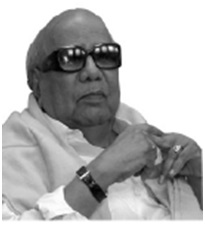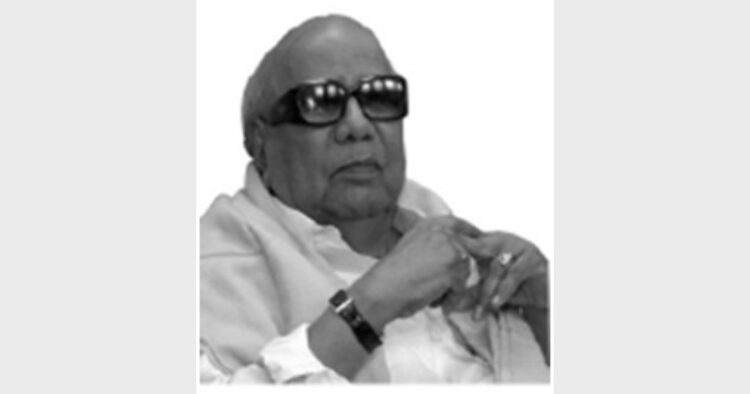 THE dirty trick played by the DMK in withdrawing its Ministers and pulling out of the Congress-led UPA government over the issue of condemning the Sri Lanka government on the Tamil separation issue has won it no friends. On the other hand it has received a media beating that it deserves.
THE dirty trick played by the DMK in withdrawing its Ministers and pulling out of the Congress-led UPA government over the issue of condemning the Sri Lanka government on the Tamil separation issue has won it no friends. On the other hand it has received a media beating that it deserves.
The Times of India (March 20) said “however much this (withdrawing support to UPA) may give DMK a convenient window to re-invent an anti-UPA avatar before the 2014 elections, it won’t advance the cause of either India or of Sri Lanka Tamils.” “Alienating Sri Lanka now” said the paper, “certainly won’t increase our ability to influence how it treats its citizens”. Also, it added, “one wonders where DMK’s conscience was slumbering when the alleged war crimes were actually taking place.” The paper also noted that “the rickety UPA coalition is looking increasingly battered and the next general election could happen this year itself.” The New Indian Express (March 20) said the DMK’s decision to pull out of the UPA “is mere posturing or an attempt to pull the rug from under Tamil Nadu Chief Minister Jayalalithaa’s feet by positioning its supremo Karunanidhi as a true champion of Tamils in India and abroad (which) only time will tell.” The paper said that while “a window of reconciliation with the Congress has been left open by Karunanidhi if a resolution is passed in the Parliament condemning Sri Lanka’s Army’s “genocide” and “war crimes”, such a resolution would “amount to submission to blackmail”. Besides, said the paper, “it would doubtless sour India’s relations with Sri Lanka.”
The paper argued that “the only viable option for the Congress now is that it should either work out a minimum common national agenda with the Opposition to meet immediate challenges or go for a fresh mandate of the people.” The Asian Age (March 20 ) said “the DMK’s sheer brazenness in announcing its pull-out from the ruling coalition at the Centre takes one’s breath away and damned it as an “opportunism”. It said for the DMK to believe “mistakenly” that it alone has backed the legitimate grievances of Sri Lanka Tamils “is both false and sanctimonious”. Claiming that for the DMK to make the kind of demand that it has now made is “clearly with an eye to the coming general elections”, the paper added that this is “only milking” the issue. The paper wanted to know why the party had not raised the issue in the summer of 2009 after the LTTE’s defeat, when atrocities on civilians are alleged to have taken place.
DNA (March 20 ) said “there is concern” that DMK’s political move is nothing but political posturing by a party whose top leaders are facing corruption charges and that it is desperate to emerge as the champion of Tamils to outdo other parties.” The paper said “probing human rights abuses is a necessary step to bring about lasting peace in Sri Lanka, an avowed goal of India too.”
Hindustan Times ( March 20) made it plain that “it is not very difficult to figure out why the DMK took its decision” to leave the coalition, considering that “the party is keen to revive its political fortune and this is the only way it can go.” The paper emphasised that “the Congress should not give in to this blackmail and allow political interference in the conduct of foreign relations.” However, said the paper, “at the same time it should remind the Lankan government of its promises to deliver a political and rehabilitation package for its Tamil community.”
The one paper to come dome hardest on the DMK is The Hindu (March 19). It came down heavily on a “fanatic fringe” which seemed “intent on hijacking the protest movement in Tamil Nadu against Sri Lanka’s treatment of its Tamil citizens.” The “mindless violence” of some of such fringe Tamil outfits, said the paper “is putting at risk India’s own moral authority to urge Sri Lanka to move towards a political settlement of the ethnic conflict”. India’s approach towards Sri Lanka, the paper went on the say “cannot hinge entirely or even primarily on domestic politics in Tamil Nadu” adding that “those in Tamil Nadu talking of a separate Eelam as a solution seem to have no clue about the human costs that would be involved in partitioning a country and a people”. India, the paper added, “must look beyond Tamil Nadu while bringing to bear diplomatic pressure on Sri Lanka and working in coordination with other countries to ensure full and equal rights for Tamils as citizens of a united Sri Lanka”. It dismissed DMK’s ‘solidarity’ with Sri Lanka Tamils as “mindless”.
Incidentally, The new Indian Express (March 22 ) said “New Delhi did well not to compromise on the basic tenets of international diplomacy by not endorsing direct intervention in internal affairs of a friendly neighbouring country.”
Incidentally, writing in The Times of India (March 20 ), a former General Officer Commanding, Indian Peace Keeping Force (IPKF) Sri Lanka, Ashok Kumar Mehta has made the point that the 30-year ethnic conflict in Sri Lanka “ended only after New Delhi gave the nod and strategic military intelligence for a fight to finish the LTTE” and is, therefore “complicit in a war which was bound to incur civilian deaths”.
Deccan Herald ( March 23) said that the Sri Lanka government has no one of blame but itself for the repeated censure it has received from the UNHRC. India’s “quiet nudging of Colombo to reach out to the Tamils to find a political solution having come to naught it was compelled to support the UNHRC resolution again…. Its vote in the UNHRC has pleased neither Sri Lanka nor Tamils in India. However, by voting for the resolution India has signaled commitment to justice, accountability and a political solution to conflicts.” The paper warned Sri Lanka that “while it will be tempted to ‘teach India a lesson’ by moving closer to China, it must understand that India is its neighbour and any attempt at baiting it could end up as a case of cutting its nose to spite its face.” The resolution, said the paper, “encourages Colombo to conduct an independent and credible investigation into alleged war crimes…” In any event the fact must be faced that for the LTTE to fight a war of independence was not only foolish but a bad example for ethnic groups living in a multi-ethnic country. It deserved to be destroyed.
?














Comments